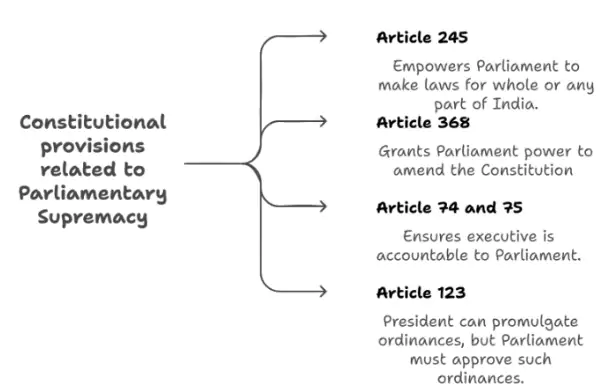Core Demand of the Question
- Discuss how growth of the cabinet system has practically resulted in the marginalisation of parliamentary supremacy
- Discuss how role of the Parliament remains significant
|
Answer
Introduction
The growth of the cabinet system in India has increasingly shifted power from Parliament to the executive, raising concerns about the erosion of parliamentary supremacy and warranting closer examination.
Body
Growth of the Cabinet System and Marginalisation of Parliamentary Supremacy
- Concentration of Power: The cabinet system centralizes decision-making, undermining Article 75’s principle of collective responsibility.
- Executive Control Over Legislation: Executive dominance in legislative processes limits Parliament’s independence and restricts private members’ bills.
For instance: Since 1952, only 14 private member’s bills have become laws.
- Bypassing of Committees: Bypassing Parliamentary Standing Committees undermines Article 118, which empowers Parliament to regulate its procedures.
Eg: The Citizenship Amendment Bill, 2019, bypassed the Parliamentary Standing Committee, reducing legislative scrutiny.
- Ordinance Issues: Frequent ordinances under Article 123 undermine Parliament’s law-making role, meant only for emergencies.
- Reduced Parliamentary Sittings: Reduced Parliament working days hinder executive oversight, conflicting with Article 85’s mandate for regular sessions.
Eg: Parliament’s average annual sitting days down to 55 in the 17th Lok Sabha from 135 in the first.
Reasons Why Role of Parliament Remains Significant

- Legislative Function: Parliament retains supreme legislative authority, balancing executive dominance through law-making powers.
- Budget Approval: Parliament’s scrutiny and approval of the national budget, under Article 265, ensures taxes are levied only with its consent, checking executive power.
- Question Hour: Through this, Parliament uses Article 105 to hold the executive accountable, ensuring transparency in governance.
Eg: MPs used Question Hour to hold the executive accountable on COVID-19 response and welfare scheme implementation.
- Impeachment Powers: Parliament can impeach Supreme Court judges under Article 124(4) and the President under Article 61, ensuring checks on constitutional functionaries.
- No Confidence Motion: The No Confidence Motion is a key parliamentary tool for assessing executive performance and ensuring accountability.
Eg: In August 2023, the Opposition moved a no-confidence motion against the government, primarily over the situation in Manipur.
Conclusion
While the cabinet’s role has expanded, a strong and active Parliament remains essential for maintaining democratic accountability and balance in governance, ensuring India’s democratic future is preserved.
To get PDF version, Please click on "Print PDF" button.


Latest Comments